|
COTTON
BUDS / SWABS
ABOUT -
CONTACTS - FOUNDATION -
HOME - A-Z INDEX
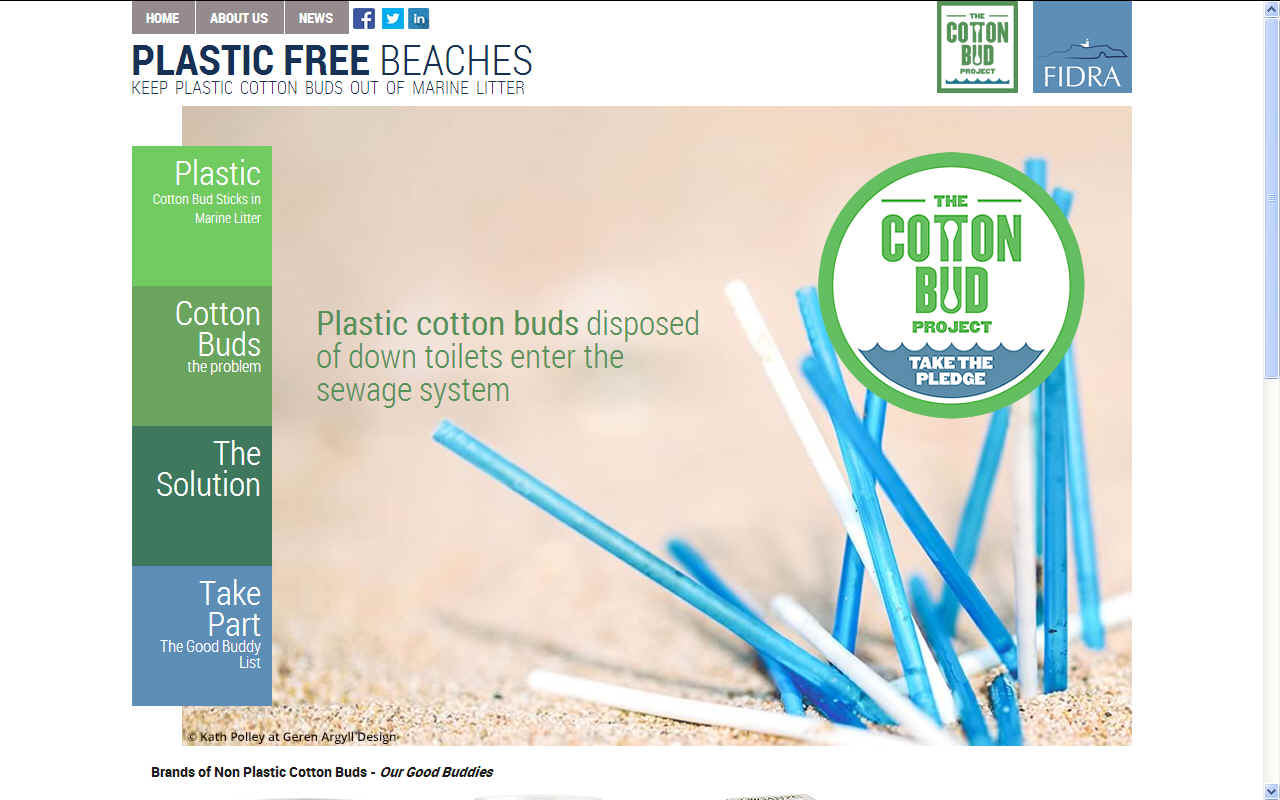
SINGLE
USE PLASTICS - This is
just a small sample of the plastic packaging that you will
find in retails stores all over the world. A good proportion
of this packaging - around 8 millions tons a year, will end up
in our oceans, in the gut of the fish
we eat, in the stomachs
of seabirds and in the intestines of whales and other marine
mammals. Copyright photograph © 22-7-17 Cleaner
Ocean Foundation Ltd, all rights
reserved.
Cotton
buds are innocent personal hygiene products that are useful but not essential, but can be
downright dangerous to marine life with plastic stems, and we make them by the
bucket load as single use items that we simply throw away after
each wax.
As
most people will know, cotton buds of old used paper stems. We
were quite content with those, so why the change to plastic?
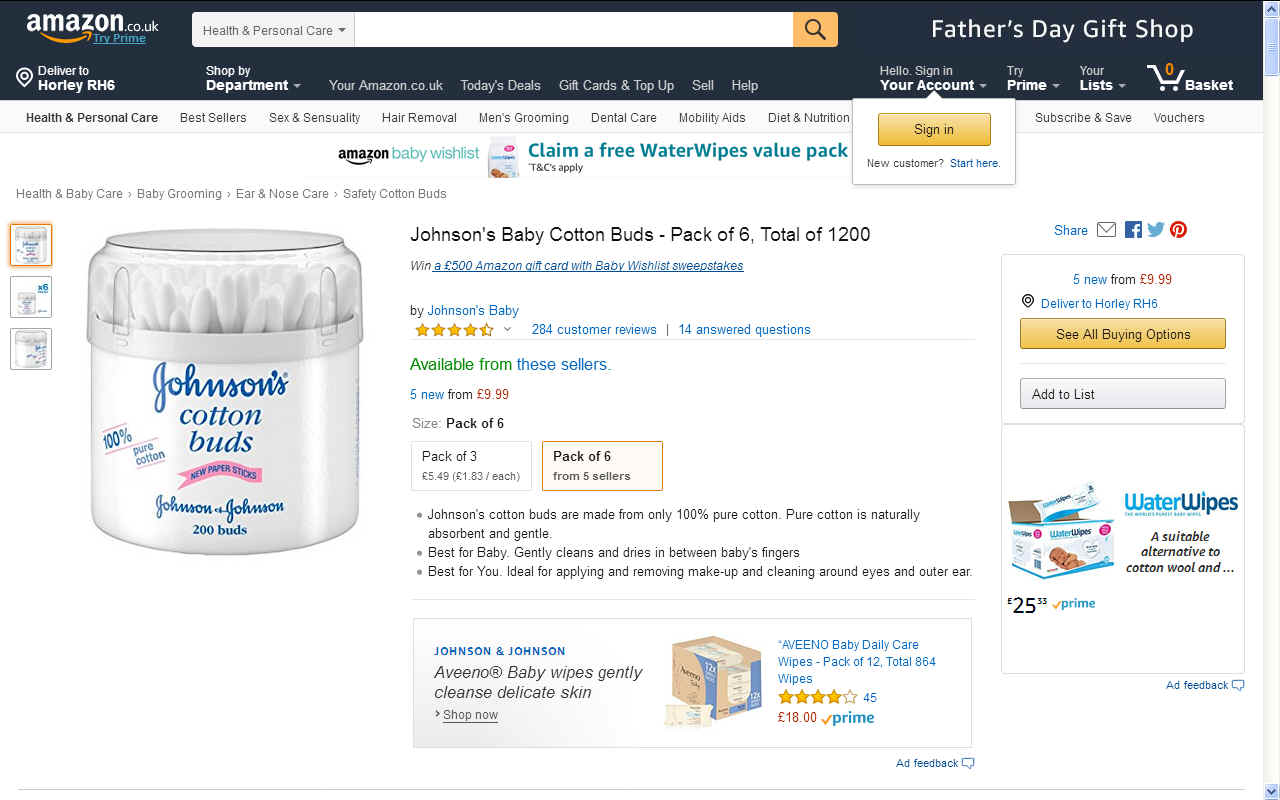
JOHNSONS
- They are useful if used carefully, but there are medical
risks to removing too much ear wax. The wax is produced
naturally by the body to protect the ear drum from infection
and insects. Being too clean is sometimes not healthy, not is
flushing plastic stemmed buds down the toilet.
BBC NEWS 19 APRIL 2018 - PLASTIC STRAW & COTTON BUD BAN
Plastic straws and cotton buds could be banned in England as part of the government's bid to cut plastic waste.
Ministers pointed to one estimate that 8.5bn plastic straws were thrown away in the UK every year.
The prime minister said plastic waste was "one of the greatest environmental challenges facing the world".
And Theresa May will urge leaders at the Commonwealth Heads of Government Meeting, which began earlier, to follow the UK's lead in tackling the problem.
The Queen has formally opened the summit at an event at
Buckingham Palace attended by
prime ministers and presidents from the 53 states that make up the organisation.
Mrs May claimed the UK was a "world leader" on tackling plastic waste, highlighting the charges that have been introduced for plastic bags, the ban on microbeads and the announcement in March of a consultation on introducing a deposit return scheme for drinks containers in England.
"Alongside our domestic action, this week we are rallying Commonwealth countries to join us in the fight against marine plastics," she said.
"The Commonwealth is a unique organisation, with a huge diversity of wildlife, environments and coastlines.
"Together we can effect real change so that future generations can enjoy a natural environment that is healthier than we currently find it."
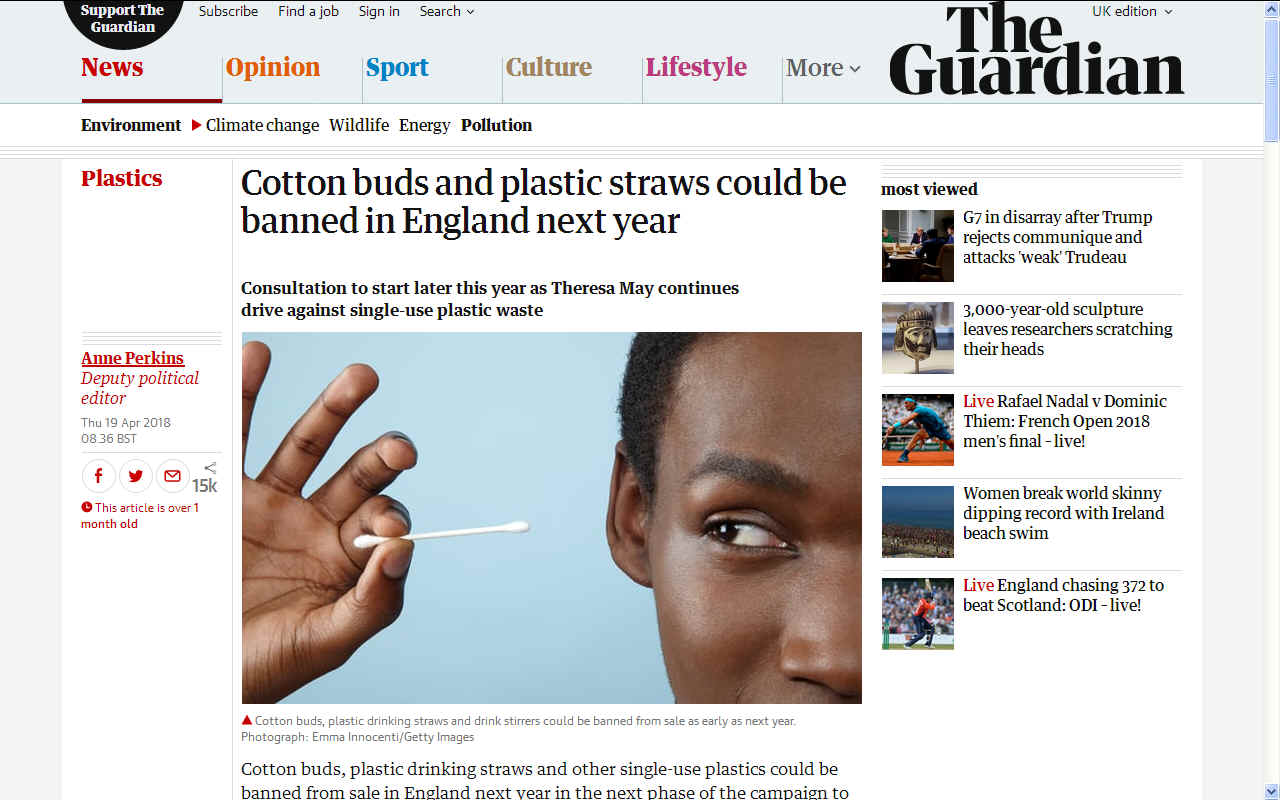
The environment secretary Michael Gove describes plastic waste as a worldwide emergency, which naturally raises questions about the speed of the government's response.
The headlines talk of a ban on plastic straws - but the announcement is about a consultation to do that. A similar exercise is under way about a deposit scheme for plastic drinks bottles, and MPs were not impressed on Wednesday when they learned that the system itself will not come into effect until 2020.
When ministers talk of the UK leading the world on this hot topic it's worth casting an eye over the actions of other countries. Dozens have actually banned plastic bags - Britain has a system of retailers having to charge for them.
And since last year Kenya has adopted the most draconian measures of all: there are fines if you use a plastic bag and if business people are caught making or importing them, they actually face up to four years in jail.
Amid many claims about fighting a war on plastic, the Kenyans are leading the charge.
It comes as 60 UK music festivals, including Bestival in Dorset and Boomtown in Hampshire, have said they will ban
plastic straws at their events this summer.
Bestival's co-founder Rob Da Bank said they were "leading the global charge against unnecessary plastic", as the group of festivals also pledged to eliminate all single-use plastic by 2021.
Environment Secretary Michael
Gove, who trailed the idea of banning plastic straws in February, will launch the consultation later this year.
"We're going to consult on what the best way is in order to get rid of straws, get rid of stirrers and also get rid of plastic stemmed cotton buds that we use so many of," he told BBC Radio 4's Today programme.
"It's a worldwide emergency - that's why we're choosing to act. It's also why we're working with other Commonwealth countries."
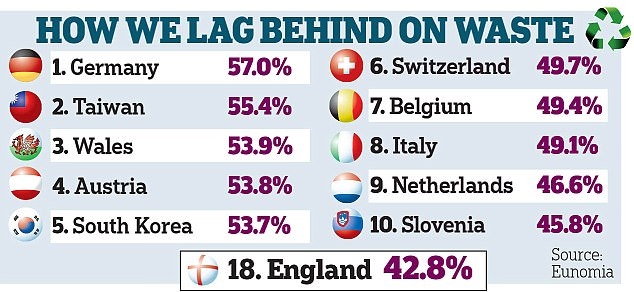
He said a consultation was necessary, particularly in relation to straws, because there were some disabled people who need to use plastic straws.
Mr Gove said a number of retailers, bars and restaurants were already cutting plastic use, with the plastic bag ban set to be extended from major retailers to all retailers.
Scotland's Environment Minister Roseanna Cunningham announced earlier this year a plan to ban plastic straws, following a similar move aimed at banning the sale and manufacture of plastic-stemmed cotton buds.
And a spokesman for the Welsh Government indicated it would also consider a ban: "We would welcome collaboration from the UK government on any action on banning straws. We will work with Defra to look at how this can be done effectively in Wales."
Greenpeace UK and Friends of the Earth have welcomed the announcement as a "step forward" but both also warned more action would be needed.
Greenpeace's Louise Edge said other non-recyclable "problem plastics" should also be banned at the earliest opportunity and retailers must take responsibility to phase out single-use plastics in their own products.
Friends of the Earth's Julian Kirby said the "only long-term solution is a complete phase-out of all but the most essential plastics".
The news was welcomed by the Green Party, but co-leader Jonathan Bartley said the government "must see these plans through to action, and bring forward the utterly un-ambitious target of eliminating all avoidable plastic waste by 2042".
Earlier this week, Mrs May announced the new Clean Oceans Alliance - an agreement between the UK, Vanuatu, New Zealand, Sri Lanka and Ghana, which pledged to ban
microbeads
cosmetics and cut plastic bag use by 2021.
To fund it, she also assigned £61.4m for global research and to improve waste management in developing countries.
Analysis: By BBC science editor David Shukman
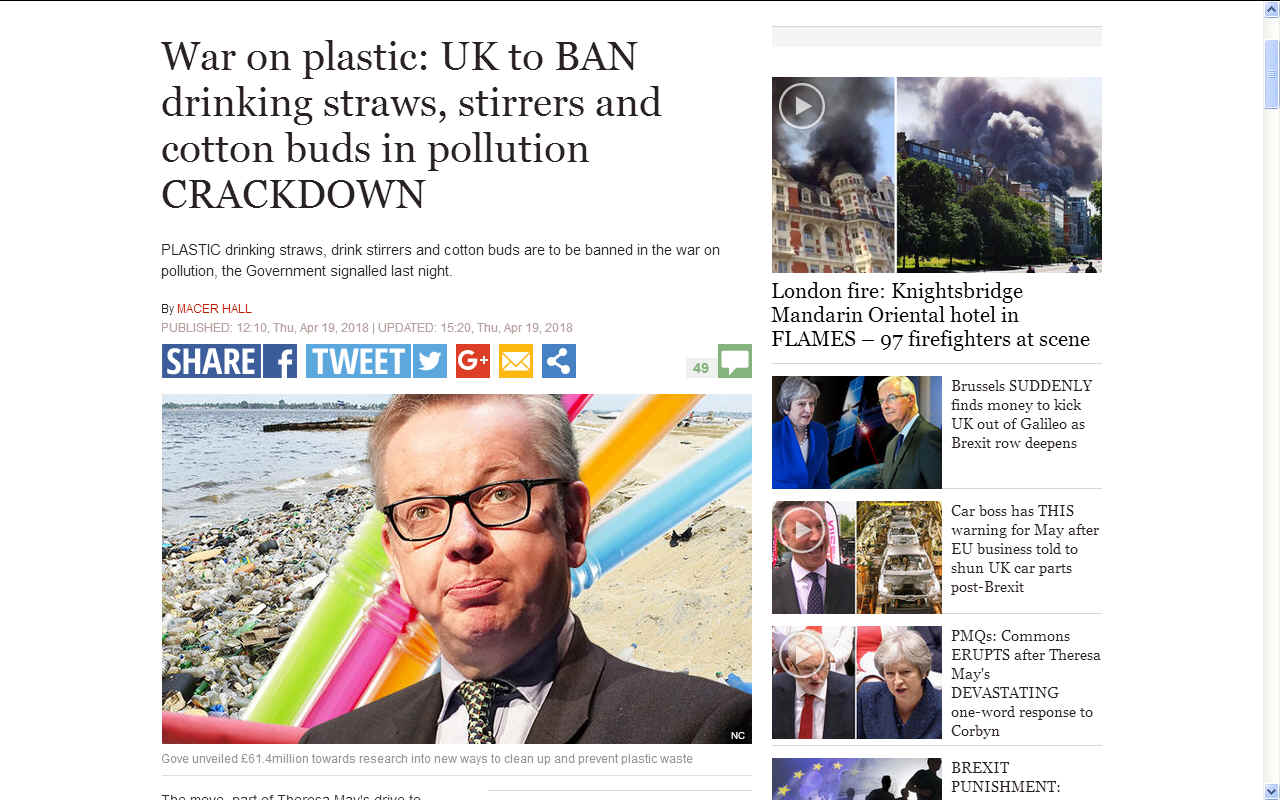
THE
GUARDIAN 19
APRIL 2018 - COTTON BUDS & PLASTIC STRAWS COULD BE BANNED IN ENGLAND
Cotton buds, plastic drinking straws and other single-use plastics could be banned from sale in England next year in the next phase of the campaign to try to halt the pollution of the world’s rivers and oceans.
Theresa May hopes to use the announcement to encourage the Commonwealth heads of government to join the fight as the meeting opens formally on Thursday. “The Commonwealth is a unique organisation with a huge diversity of wildlife, and environments – so it is vital we act now,” the prime minister will say, urging all Commonwealth countries to participate.
Cotton buds, often flushed down the lavatory, are one of the most serious sources of marine pollution. They are small enough to be eaten by birds and marine life.
Altogether it is estimated that there are 150m tonnes of plastic in the world’s oceans, and over 100,000 sea mammals die from eating or getting tangled up in plastic waste.
Plastic microbeads have already been banned, and the introduction of the 5p plastic bag charge in England has led to a dramatic fall in their use: 9bn fewer bags have been distributed, Department for Environment, Food and Rural Affairs (Defra) figures show.
Michael Gove, the Defra secretary, called single-use plastics a scourge. “It is only through government, business and the public working together and the public working together that we will protect our environment for the next generation,” he said.
A consultation will start later in 2018, and a ban could be enforced as early as next year.
Scotland has a head start on England: the Scottish government announced a consultation on plans to ban the manufacture and sale of plastic-stemmed cotton buds in January. Campaigners said it would cut the country’s sewage-related marine plastic pollution by a quarter.
Other work, such as the Treasury’s research into the impact of a levy on disposable coffee cups and a deposit return scheme on plastic bottles, is also under way in a bid to wean Britons off their polluting habits.
But sources say behaviour will not be changed through regulation and compulsion. Ministers are keen that the public should be better informed about plastics that are reusable and recyclable, and want the process to be incremental and well supported, as the plastics bag levy was when it was finally introduced.
A further incentive to avoid the use of plastics is the impact that reduced demand for the oil-based material would have on the fossil fuel industry. BP announced recently that it would “dent” demand.
There is evidence that increasingly prosperous countries of the global south are beginning to react to environmental damage and pollution. Earlier this year, China cracked down on imports of plastic rubbish, revealing how much the UK relied on sending its waste offshore.
In India, Delhi banned all forms of disposable plastic more than a year ago after complaints about the illegal mass burning of plastic and other waste at local rubbish dumps, and the air pollution it caused. The sites were supposed to operate as waste-to-energy plants.
The evidence of the damage that plastics do not just to wildlife and the food chain but to some of the world’s most beautiful places is now widely reported. The government has committed £61.4m to its latest initiative, some of which will be used for research and to help Commonwealth countries develop ways of stopping plastic waste entering oceans.
By Anne
Perkins
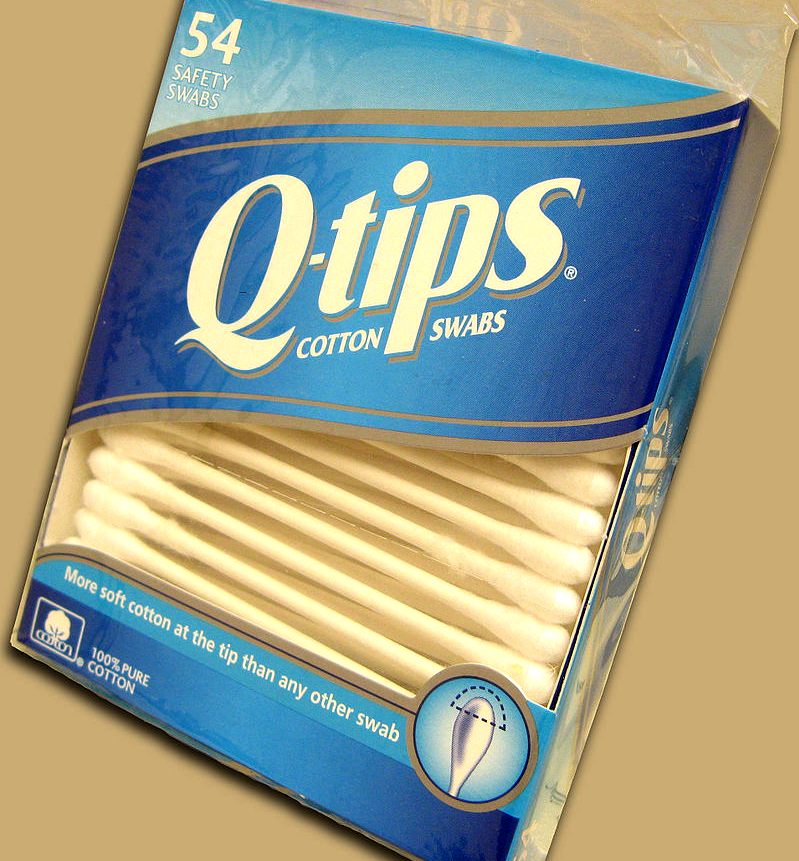
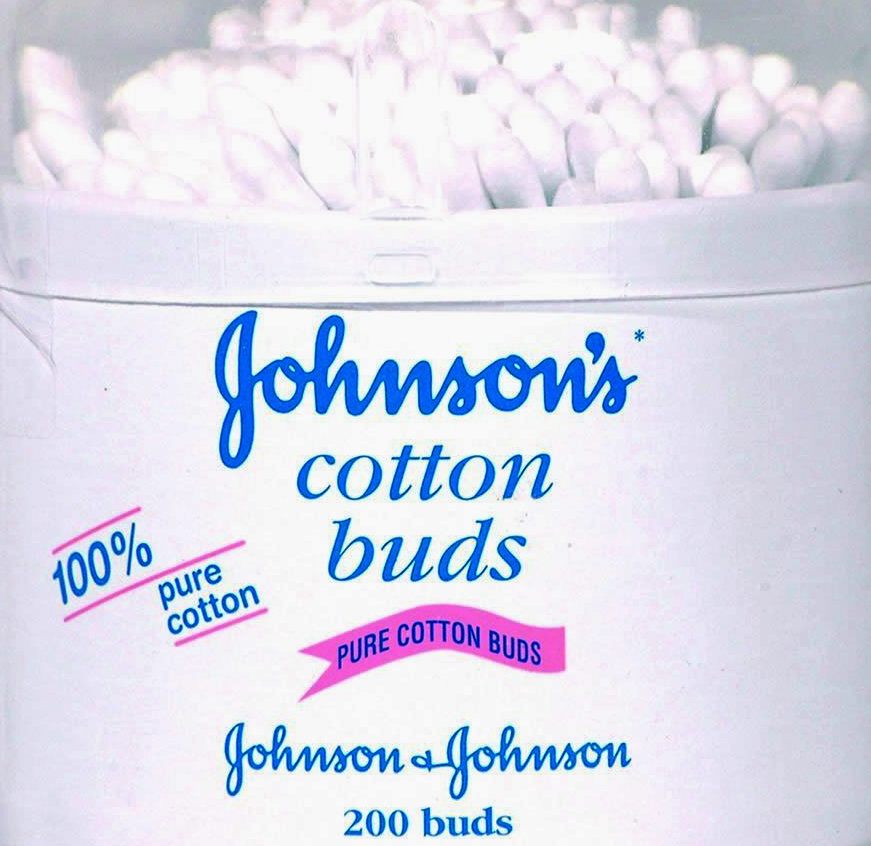
ABOUT
COTTON BUDS
Plastic cotton swabs are often incorrectly flushed down the toilet, increasing the risk of marine pollution. Some manufacturers and retailers have stopped the production and sale of plastic swabs and are only selling biodegradable paper versions. Scotland's government announced in February 2018 that it will ban the sale and manufacture of plastic cotton swabs.
The traditional cotton swab has a single tip on a wooden handle, and these are still often used, especially in medical settings. They are usually relatively long, about six inches (15 cm). These often are packaged sterile, one or two to a paper or plastic sleeve. The advantage of the paper sleeve and the wooden handle is that the package can be autoclaved to be sterilized (plastic sleeves or handles would melt in the autoclave).
Cotton swabs manufactured for home use are usually shorter, about three inches (7.6 cm) long, and usually double-tipped. The handles were first made of wood, then made of rolled paper, which is still most common (although tubular plastic is also used). They are often sold in large quantities, 100 or more to a container.
Plastic swab stems exist in a wide variety of colors, such as blue, pink or green. However, the cotton itself is traditionally white.
MOST COMMON USE
The most common use for cotton swabs is to clean or caress the ear canal and/or to remove earwax, despite this not being a medically recommended method for removing earwax. Cotton swabs are also commonly used for applying and removing makeup, as well as for household uses such as cleaning and arts and crafts. They are also handy for touching up nail polish that gets on the surrounding skin.
Medical-type swabs are often used to take microbiological cultures. They are rubbed onto or into the infected area, then wiped across the culture medium, such as an agar plate, where bacteria from the swab may grow. They are also used to take DNA samples, most commonly by scraping cells from the inner cheek in the case of humans. They can be used to apply medicines to a targeted area, to selectively remove substances from a targeted area, or to apply cleaning substances like Betadine. They are also used as an applicator for various cosmetics, ointments, and other substances.
A related area is the use of swabs for microbiological environmental monitoring. Once taken, the swab can be streaked onto an agar plate, or the contents of the tip removed by agitation or dilution into the broth. The broth can either then be filtered or incubated and examined for microbial growth.
MEDICAL RISKS
The use of cotton swabs in the ear canal has no associated medical benefits and poses definite medical risks. Cerumen (ear wax) is a naturally occurring, normally extruded product of the external auditory canal that protects the skin inside the ear, serves beneficial lubrication and cleaning functions, and provides some protection from bacteria, fungi, insects, and water.
Attempts to remove cerumen with cotton swabs may result in cerumen impaction, a buildup or blockage of cerumen in the ear canal, which can cause pain, hearing problems, ringing in the ear, or dizziness, and may require medical treatment to resolve. The use of cotton swabs in the ear canal is one of the most common causes of perforated eardrum, a condition which sometimes requires surgery to correct. For these reasons, the American Academy of Family Physicians and many other professional medical associations recommend never placing cotton swabs in the ear canal.
A 2004 study found that the "use of a cotton-tip applicator to clean the ear seems to be the leading cause of otitis externa in children and should be avoided." Instead, wiping wax away from the ear after a shower almost completely cleans the one third of the outer ear canal where earwax is made. In the US between 1990 and 2010, an estimated 263,338 children went to hospital emergency rooms for cotton swab injuries, for an estimated annual hospitalization of 13,167 children.
INVENTION
The tool was invented in the 1920s by Polish-American Leo Gerstenzang after he watched his wife attach wads of cotton to toothpicks. His product, named "Baby Gays", went on to become the most widely sold brand name: Q-tips, meaning "quality tips". The term "Q-tips" is often used as a genericized trademark for cotton swabs in the US and Canada. The Q-tips brand is owned by Unilever and had over $200 million in US sales in 2014. Although doctors have said for years that it is not safe to use cotton swabs for ear cleaning, it remains the most common use.
LINKS
& REFERENCE
https://www.theguardian.com/environment/2018/apr/18/single-use-plastics-could-be-banned-in-england-next-year
https://www.cottonbudproject.org.uk/
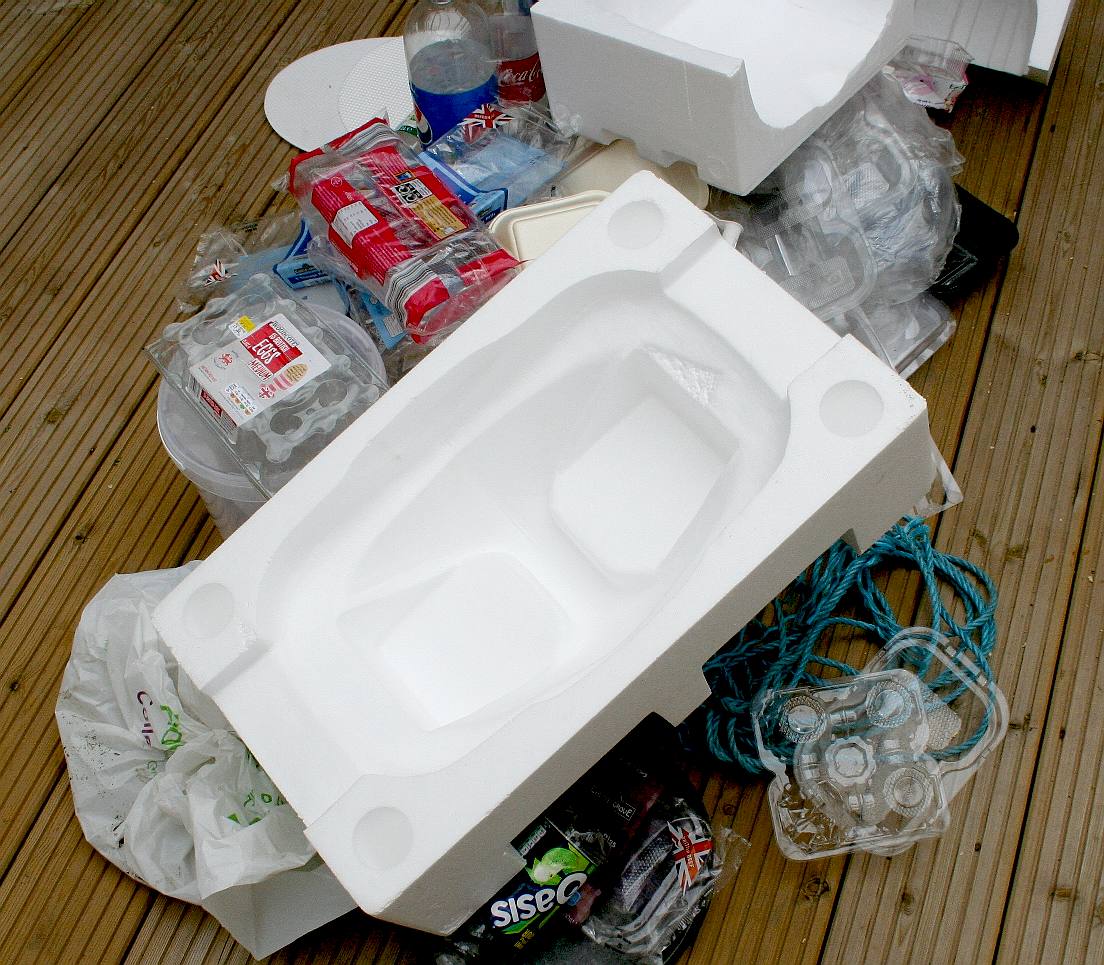
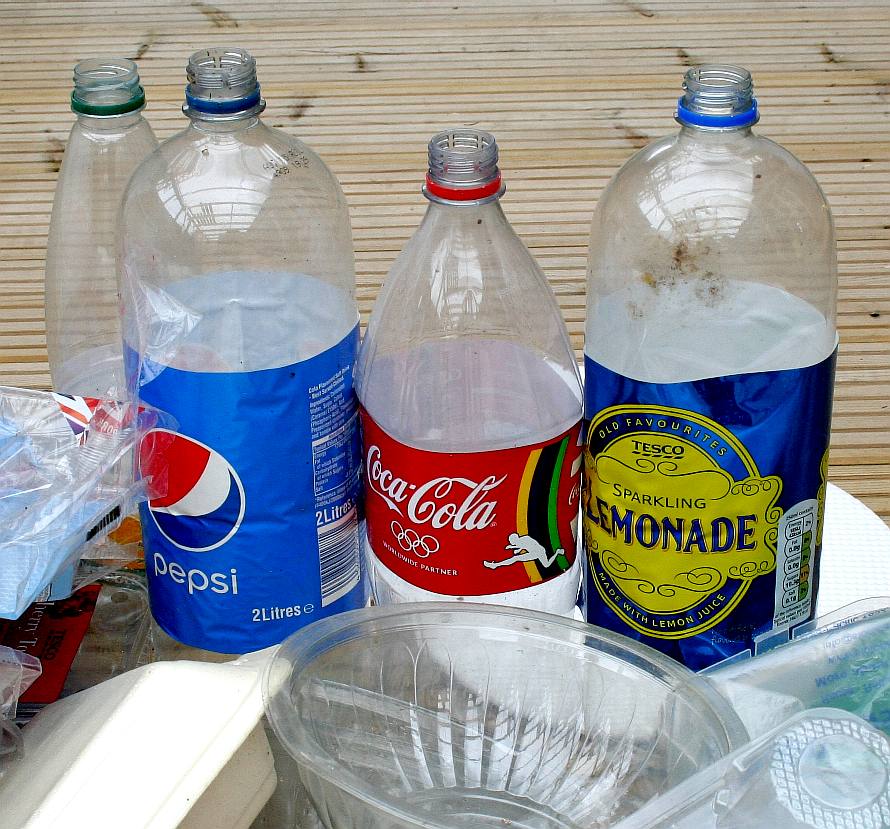
FOAM
& BOTTLES - Expanded polystyrene is
used to package household electrical goods, while soft drinks and water is
sold in PET plastic bottles by the billions every year. The numbers are
staggering. It's no wonder then that some of this plastic will end up on our
plate in one form or another, potentially as a toxin carrier. Copyright
photograph © 22-7-17 Cleaner Ocean Foundation Ltd, all rights reserved.
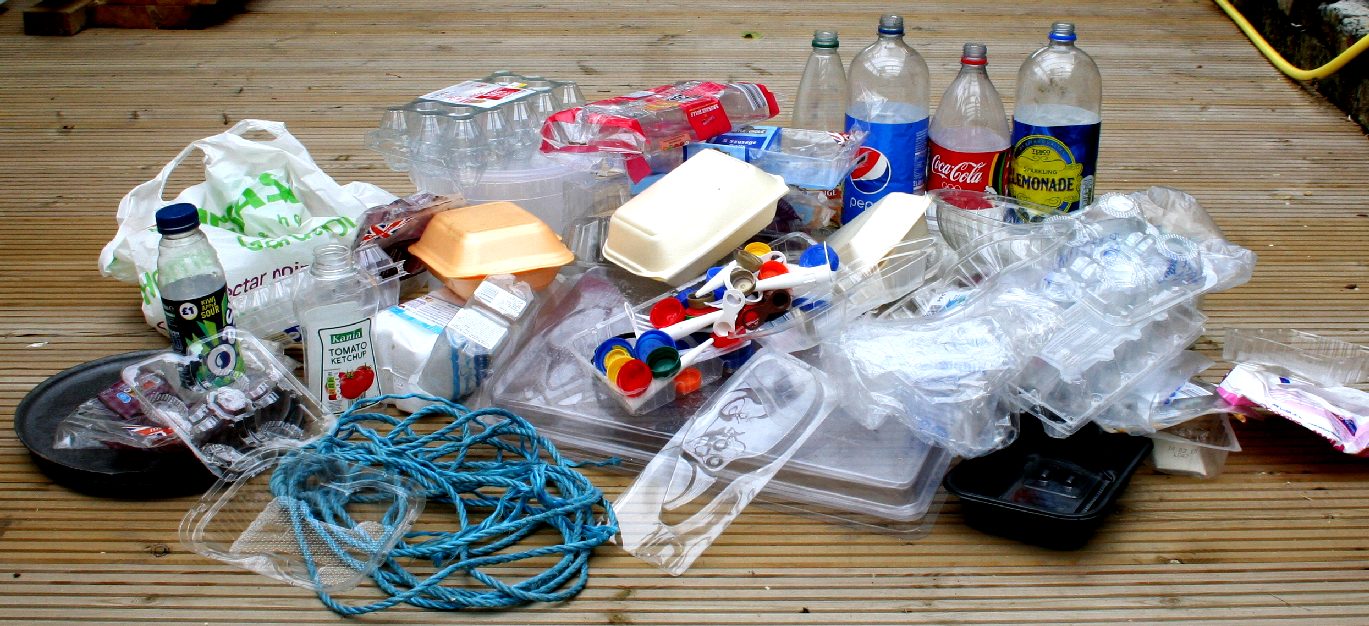
ABS
- BIOMAGNIFICATION
- BP DEEPWATER - CANCER
- CARRIER BAGS
- CLOTHING - COTTON BUDS - DDT - FISHING
NETS
FUKUSHIMA - HEAVY
METALS - MARINE LITTER
- MICROBEADS
- MICRO
PLASTICS - NYLON - OCEAN GYRES
- OCEAN WASTE
PACKAGING - PCBS
-
PET - PLASTIC
- PLASTICS
- POLYCARBONATE
- POLYSTYRENE
- POLYPROPYLENE - POLYTHENE - POPS
PVC - SHOES
- SINGLE USE
- SOUP - STRAWS - WATER
This
website is provided on a free basis as a public information
service. copyright © Cleaner
Oceans Foundation Ltd (COFL) (Company No: 4674774)
2018. Solar
Studios, BN271RF, United Kingdom.
COFL
is a charity without share capital.
|









